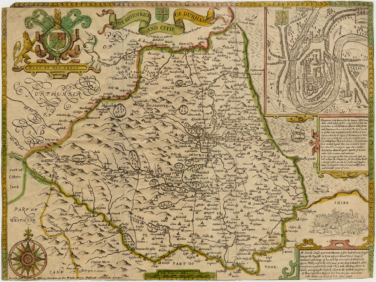County Durham

Most of the Durham records (which include the second largest monastic archive in England) are held in Durham University Library, Durham Cathedral Library and Durham County Record Office, though there is some material in the British Library, the Bodleian Library and the National Archives.
Documents are being collected from the Cathedral’s financial, liturgical and chronicle material and from the city’s trade company records. These include:
- A mass of evidence for the interface between drama and liturgy, and between monastic and lay communities. This includes many detailed financial records, two 14th-century liturgical manuscripts with ‘stage directions’ for dramatic ceremonies, and The Rites of Durham, a late-16th-century recusant work which describes the dramatic ceremonies of the pre-reformation Cathedral. Some ceremonies, like those on Good Friday, are typical of the medieval western church, while others, including two boy bishops around Ascension Tide, appear to be particular to Durham. The procession and plays on Corpus Christi day can be interestingly contrasted with those at York, Beverley and Newcastle.
- Records of folk drama, including the earliest known Plough Ceremony (first recorded in 1378); a folk-play man/woman figure (1433-34); a stag ceremony, suppressed in 1315, which the priory regarded (probably correctly) as pre-Christian; and the Durham Cantata, a 16th-century musical fragment which describes celebrations on the Feast of St. Cuthbert, including a Robin Hood play and a ‘young maids’ procession’.
- The names, skills and patrons of a large variety of performers, including musicians, waits, fools, a dwarf, a man with a performing dog, a wrestler, an Italian exhibitor of what was claimed to be a dragon, and companies with royal or noble patronage.
Further material can be expected to emerge from chronicle and antiquarian sources that have still to be searched. These records will be made available in a transcribed but unedited format on this page in the near future.
Pre-publication records currently available
[listrecords region=”County Durham”]
Prior of Holy Island’s Accounts
Map of locations relating to Durham records
[wpgmza id=”4″]
